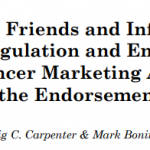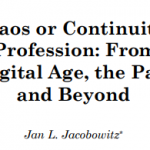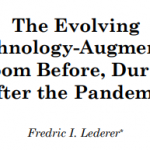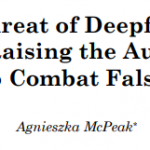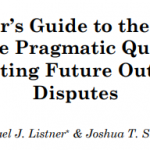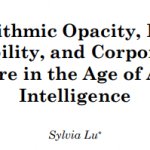Volume 23
Regulating Data Breaches: A Data Superfund Statute
May. 25, 2021—Kyle McKibbin | 23 Vand. J. Ent. & Tech. L. 649 (2021) Collecting and processing large amounts of personal data has become a fundamental feature of the modern economy. Personal data, combined with good data analytics, are valuable to businesses as they can provide highly detailed information about individual preferences and behaviors. This data collection...
Envisioning the FTC as a Facilitator of Blockchain Technology Adoption in the Direct-to-Consumer Genetic Testing Industry
May. 25, 2021—Noah Spector | 23 Vand. J. Ent. & Tech. L. 679 (2021) Seemingly overnight, the kingpins of the direct-to-consumer genetic testing (DTC-GT) industry shifted their focus from exploring their customers’ DNA to commodifying it. Companies like Ancestry or 23andMe that were once exclusively known as mere sources of “infotainment” now regularly sell consenting customers’ genetic...
To Win Friends and Influence People: Regulation and Enforcement of Influencer Marketing After Ten Years of the Endorsement Guides
Apr. 9, 2021—Craig C. Carpenter & Mark Bonin II | 23 Vand. J. Ent. & Tech. L. 253 (2021) For the last ten years, social media influencer marketing has been regulated by the Federal Trade Commission (FTC) under the FTC’s Section 5 “unfair practices” authority, guided by the Endorsement Guides, a “best practices” document published by the...
Chaos or Continuity? The Legal Profession: From Antiquity to the Digital Age, the Pandemic, and Beyond
Apr. 9, 2021—Jan L. Jacobowitz | 23 Vand. J. Ent. & Tech. L. 279 (2021) The idea of individuals entering into a social contract to relinquish some of their rights in order to have a civilized society protect their fundamental rights originates at least as early as ancient Greece, where it was espoused by the philosopher Epicurus....
The Evolving Technology-Augmented Courtroom Before, During, and After the Pandemic
Apr. 9, 2021—Fredric I. Lederer | 23 Vand. J. Ent. & Tech. L. 301 (2021) Even before the COVID-19 Pandemic, technology was changing the nature of America’s courtrooms. Access to case management and e-filing data and documents coupled with electronic display of information and evidence at trial, remote appearances, electronic court records, and assistive technology for those...
Fair Play: Notes on the Algorithmic Soccer Referee
Apr. 9, 2021—Michael J. Madison | 23 Vand. J. Ent. & Tech. L. 341 (2021) The soccer referee stands in for a judge. Soccer’s Video Assistant Referee (VAR) system stands in for algorithms that augment human deciders. Fair play stands in for justice. They are combined and set in a polycentric system of governance, with implications for...
The Threat of Deepfakes in Litigation: Raising the Authentication Bar to Combat Falsehood
Apr. 9, 2021—Agnieszka McPeak | 23 Vand. J. Ent. & Tech. L. 433 (2021) Deepfakes are all over the internet—from shape-shifting comedians and incoherent politicians to disturbingly realistic fake pornography. Emerging technology makes it easier than ever to create a convincing deepfake. What used to take significant time and money to develop is now widely available, often...
Watching Androids Dream of Electric Sheep: Immersive Technology, Biometric Psychography, and the Law
Apr. 9, 2021—Brittan Heller | 23 Vand. J. Ent. & Tech. L. 1 (2021) Virtual reality and augmented reality present exceedingly complex privacy issues because of the enhanced user experience and reality-based models. Unlike the issues presented by traditional gaming and social media, immersive technology poses inherent risks, which our legal understanding of biometrics and online harassment...
A Litigator’s Guide to the Galaxy: A Look at the Pragmatic Questions for Adjudicating Future Outer Space Disputes
Apr. 9, 2021—Michael J. Listner & Joshua T. Smith | 23 Vand. J. Ent. & Tech. L. 53 (2021) Since the beginnings of the space age, outer space activities have been the realm of government with ancillary involvement by non-governmental actors. The international legal framework for outer space contemplated the involvement of non-governmental actors, but in creating...
Algorithmic Opacity, Private Accountability, and Corporate Social Disclosure in the Age of Artificial Intelligence
Apr. 9, 2021—Sylvia Lu | 23 Vand. J. Ent. & Tech. L. 99 (2021) Today, firms develop machine-learning algorithms to control human decisions in nearly every industry, creating a structural tension between commercial opacity and democratic transparency. In many of their commercial applications, advanced algorithms are technically complicated and privately owned, which allows them to hide from...

